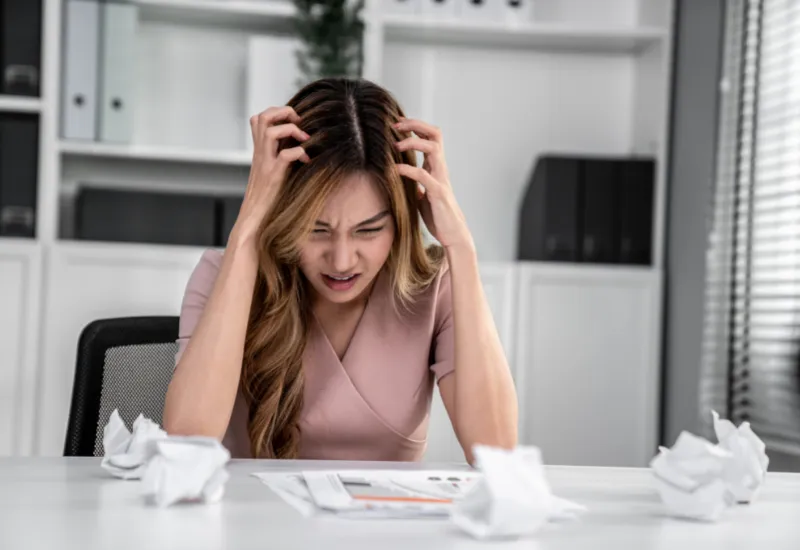Irrespective of whether you’re talking about physics or mental health, stress is defined as unmanageable pressure. In the sense of mental health, stress usually means that your mind has so many unmeasurable pressures that are no longer able to cope up with the tasks that it has to do.
What is Stress
Essentially stress is our body’s defence mechanism of sorts. We need stress to respond to the pressures around us. When we feel too much pressure or are overwhelmed by several tasks, that might give a signal to our brains that we need to calm down and manage our tasks in a way that we get everything done. You know how some people say that they function best when they are stressed, this is the reasoning behind that statement.
Stress, or the extent of stress varies from person to person. People may feel stressed due to different reasons. What may stress you out, might not stress the other person out. This further depends on a lot of factors. Interest in a particular topic can be one of them. For example, the increasing unemployment rate may be something that could be a high-stress factor for someone who is a recent university graduate. But, may hold low importance for the middle-aged CEO of a large multinational corporation.
Other stress factors may include feeling something new or unexpected. For example, someone who is flying on an aeroplane for the first time may feel an intense amount of stress, however, someone who is a frequent flyer might as well sleep through the entire plane ride.
Over the years, mental health and stress management has gotten a lot of attention in cultures around the world, especially the West where taking days off for one’s mental health is becoming more and more accepted. This is largely due to the increased amounts of awareness around the world and the efforts that have been made by some organisations and people towards a more positive and understanding society.
Moreover, due to the nature of our world today, especially the fast-paced corporate environment where it is every man for themselves. People now have a lot on their plate. It is all about the hustle now. The average person who has a 9 to 5 job also has a side business, and dedicated time to make room for their hobbies, they also have to spend time with their families and their friends. The college student has so much material to absorb for their classes that spending time to study for an exam may take up to hours upon hours. Moreover, with the pandemic on the rise again, marking the first year of the coronavirus complete. People are still feeling the side effects of the disease even if they were never directly infected by it.
People have lost their jobs, faced salary cuts, been stranded in foreign countries due to travel restrictions, and have even seen their loved ones pass away and suffer in front of their eyes. Life has at the moment, not been kind to a lot of people, and the effects of this have taken a huge toll on a large amount of the population.
Therefore, we need to find effective ways to manage the stress in our lives. We see many articles and life hacks for this. However, in the frenzy of trying to feel better, a lot of people try out many activities that might not benefit them at all. So we will highlight the best and the worst ways to manage stress in this article.
The Best Ways to Manage Stress
One of the best ways to manage stress is to consider daily exercise. Depending on your body type and what you want, also in accordance to the amount of resources you have. You can figure out an exercise regime that suits you best. This exercise regime can be as complicated as going to the gym for muscle building or trying at-home yoga techniques. It does not matter per se, as long as you are consistent.
Trying to change your diet for a more healthy alternative is also a good way to reduce stress, as the nutrients in your food play an important part in your overall health. Also, the healthier food you eat, the better you feel. Trying to have a consistent sleep schedule is also very important. And make sure to drink a lot of water and other fluids. Categorising your tasks in a clear cut to-do list and making big tasks into smaller manageable ones helps out as well.
Moreover, if you still feel overwhelmed and want somebody to talk to, please try seeing a therapist, as it might help you cope with your stress. Stress also comes with its fair share of physical side effects such as weight loss and weakness and for that you might want to consult a doctor.
The Worst Ways to Manage Stress
In the panic of trying to feel better, we might try some things that are not beneficial for us. These include eating junk food and mistaking it for comfort food, losing sleep to complete tasks that are undone. Disassociating from friends and family because we have too much on our plate. Not making time to eat properly, and the most common, overworking ourselves to get things done. Although in the short run these might feel to be the best options, they truly are not and have bad long term effects on our bodies, which we need to be careful of.












